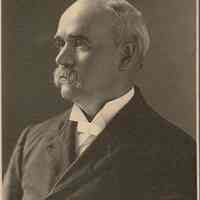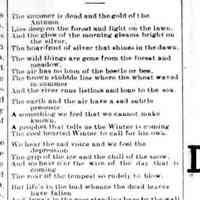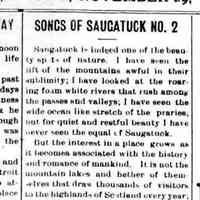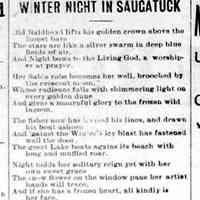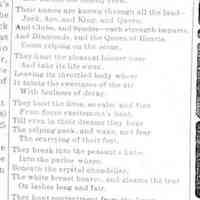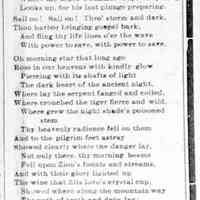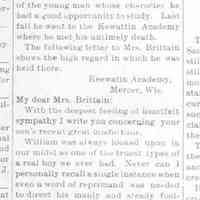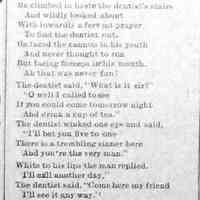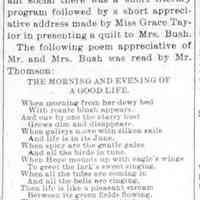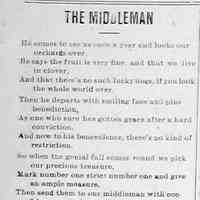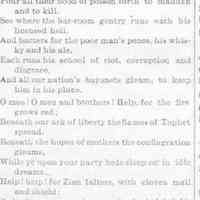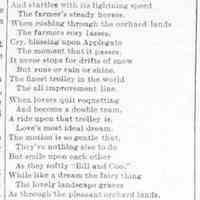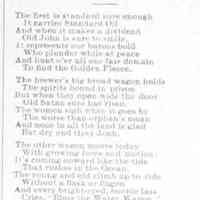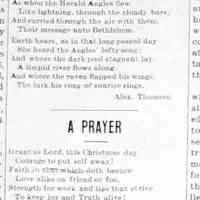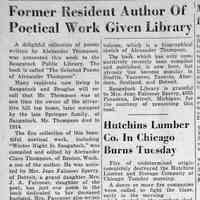Rev. Alexander Thomson, minister, poet
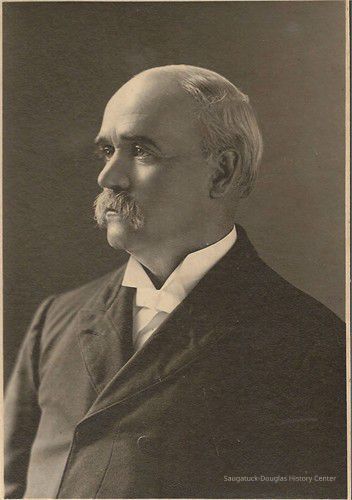
2023.10.407
Rev. Alexander Thomson - Minister and Poet - contributed by Chris Yoder, Apr. 2011 When he died in Saugatuck of liver and pancreatic cancer March 10, 1914, Alexander Thomson had led a full life. Born in 1844 in Aberdeen, Scotland, he and his family sailed to Canada in 1856. In 1864 he came to the U.S., serving briefly in the Civil War to obtain his citizenship. In his twenties he taught school, first near Allegan, Michigan, and later in Wheaton, Illinois, where he also attended Wheaton College. Feeling a call to the ministry, he was ordained in the Congregational church on Oct. 21, 1887. He began his service at Bartlett, Illinois, and was in active ministry for 21 years, both in Illinois and Wisconsin. He first married Laura Jane Holt, who died leaving three children, Mabel, Laura and Alexander Jr. His second wife also died young. While pastoring a northern Wisconsin church he met and married a young teacher, Jeanette Harris, by whom he had another daughter, Jeanette. Mabel was to marry Saugatuck boy J. A. Falconer, later a Congressman from Washington State. His obituary remarks that he had first come to Saugatuck 28 years before (c1876) and spent a portion of his time here ever since, eventually making it his permanent home. As early as the 1889 assessment record, it shows that Alexander owned 28 acres of land downstream from Saugatuck on the east bank of the Kalamazoo River. This property was called "Slumber Bluff" and was left to his wife Jeanette. From 1923 to 1950, Jeanette and two friends from Chicago operated this property as "Oak Openings" camp. Jeanette died in 1956 and is buried at Riverside beside her husband. The Jan. 20, 1950 issue of the Commercial Record announces the donation to the library of the book "Selected Poems of Alexander Thomson" which had been compiled by his son Alexander. Daughter Mabel Thomson Falconer wrote "Alexander Thomson wrote poetry from early manhood. It seems that there never was a period of his life when he did not express his thoughts and his emotions by means of verse. His poems were quite widely published in various papers and localities, and especially in "The Christian Cynosure," Chicago, Illinois, which paper was his best literary friend." (No, the book is no longer in the library holdings, but we have found a copy for the future SDHS research library.) The following poem from the book first appeared in the Feb 7, 1908 Commercial Record: WINTER NIGHT IN SAUGATUCK Old Baldhead lifts his golden crown above the forest bare The stars are like a silver swarm in deep blue fields of air, And Night bows to the Living God, a worshiper at prayer. Her Sable robe becomes her well, brooched by the crescent moon, Whose radiance falls with shimmering light on every golden dune And gives a mournful glory to the frozen wild lagoon. The fisher now has housed his lines, and drawn his boat ashore And 'gainst the Winter's icy blast has fastened well the door. The Great Lake beats against its beach with long and muffled roar. Night holds her solitary reign yet with her own sweet grace The snow flower on the window pane her artist hands will trace, And if she has a frozen heart, all kindly is her face. --Alexander Thomson Other poems in the Commercial Record include: "Morning and Evening of A Good Life" -a farewell read to Rev. and Mrs. F. W. Bush of Douglas, on their move to Hopkins, Michigan- 1/7/1910; an untitled poem on the hunting death of William Brittain, 2/4/1910; "The Veteran In The Dentist's Office", 4/8/1910; "The Middleman"- 1/31/1913. The Rev. Thomson's obituary speaks of the inspirational way in which he faced his final painful days. The following was written shortly after his doctor had told him his illness would be fatal: Not like the dog to his kennel, Not like the ox to his stall, Not like the horse to his stable When the night begins to fall: But I look for the beams of gladness To break through the clouds of pain: I wait for the call of the master And his sunshine after the rain. --- Another poem in anticipation of his death: THE LIGHT AFFLICTIONS THAT ARE BUT FOR A MOMENT Are these afflictions light my Lord? They force the tear and start the sigh: They make the young spring forest sear And leave the once full channel dry. But for a day? Nay days and years Are black with gloom, and grim with pain, The barren earth sharp thorns rear. Hot scalding tears are all the rain, O story past out human thought, O wonder working God, we know That often when the shadows fall There comes the evening afterglow. And so we wait the open door The greatness of the glad release, The day when all thy Squadrons ride, Full laden to the port of peace. -Alexander Thomson More Saugatuck Poems from His Book: --- MEMORIAL TO MR. HOUSE, SAUGATUCK FARMER, 1897 [Harvey L. House] He moved his quiet way along, Simple, earnest and sincere, He helped the weak, he dried the tear, And cheered the singer in his song. He saw the truth and loved it well, He followed where its banners flew, And with the many or the few He never stopped to count or tell. A quiet, common life he crowned With worth that was no common kind, But true in heart and clear in mind He made his acres hallowed ground. Then let him rest, his work is done; But that life impulse he has given Shall reach the very gates of heaven With blessings ere its course is run. --- SINGAPORE Alone on the deep dark waters I paddle my skiff along, While the torn clouds float above me And the night bird sings her song; And the sand dunes rise like mountains From their unsubstantial base, And only the lone fox prowling Frequents that desert place. Before me a town deserted, With never a dwelling there, Where only the bats' gyrations Startle the somber air. There woodcock sits enchanted In the shimmering poplar tree, Watching the moon as it saileth Through cloudland mystery. Rev. Thomson Writes of Saugatuck Folklore SONGS OF SAUGATUCK NO.2 In the April 2011 newsletter, we shared a number of poems by the Reverend Alexander Thomson (1844-1914). In the Commercial Record of Nov. 29, 1907, Thomson recorded in poetry what he was told to be a true event of almost forty years before. Thomson introduced his poem by describing how the romance of history adds to the charm of Saugatuck: "Saugatuck is indeed one of the beautiful spots of nature. I have seen the lift of the mountains awful in their sublimity; I have looked at the roaring foam white rivers that rush among the passes and valleys; I have seen the white ocean like stretch of the prairies; but for quiet and restful beauty I have never seen the equal of Saugatuck. "But the interest in a place grows as it becomes associated with the history and romance of mankind. It is not the mountain lakes and heather of themselves that draws thousands of visitors to the highlands of Scotland every year, but Rob Roy, Scott, Wallace and Bruce. The treasures of history and romance increase the charm a hundred fold. So with our pretty little village of Saugatuck and its environment. Let us surround it with history, song and romance. This poem is a story substantially as I heard it from an old citizen of Saugatuck now residing in Two Rivers, Wis." Thomson tells of post-Civil War Saugatuck, where an argument between a southern sympathizer and a Michigan native led to a shooting, and to a narrowly averted lynching--- with a local minister as the hero of the day: A "Hot Spur" from the southern land Came northward till he struck The forest walled, and sawdust streets. Of "Booming" Saugatuck. Then men were free with fist and tongue, And he who had the better lung, In wordy wars might hope to be, King of the pine woods chivalry. In these old days when the place was new The Metled Hot Spur of the south, Managed to find a job to do But could not manage his mouth. Proud of spirit he could not brook The bantering word, or saucy look Of the pine wood boys who found delight In rousting the ire of the southern knight. Hot he whose temper's a run way steed, Is likely to find e're his day is done, He may have to pay in his flesh and blood, Full tale for his wild eyed run. There came a day when his southern ire Like steel from a flint struck fiercest fire, In a trice his pistol was out and then, Down in the dust lay one of our men. Down by the river the village jail (A queer old shant) had its place And there subdued and quiet and pale The man with the pistol ended his race. For well he knew that a storm was brewing That a judge would sit on his saving and doing A judge that never sat on a bench Whose law was his passion, the stern Judge Lynch. He came that night with his many tongues Wild of heart and of will, He gave his decree from the vere start In the brief and terrible syllable kill. Nor neither the jail nor the man inside Had favor with that tumultuous tide Of men, and they cried: "Down with him forever The jail and the jail bird into the river." Strong hands took hold of the ramshackle thing And soon on the tide it had floated that day When the village preacher through the crowd Quickly and manfully made his way, The boys all liked him, for well they knew Here was a man who was strong and true, Afraid of none and to all a friend, Here was a man that the Lord did send. The stumps stood thick and he climbed on one, This was his pulpit for the time "Boys" he said and the crowd was still "Boys" will you blacken your hearts with crime? The law has been broken, will you again Break in upon Orders fair domain And shatter the law that was made to be A refuge and bulwark for you and me? Our comrade is down but the hand of the state Has gripped the felon that struck the blow And not till he pays the very last mite Will the iron hand of the law let go O men and brothers let us beware How the garment of order we rudely tare, And let in upon us the law that comes With the crack of the rile and roll of the drum. We have said they loved him and knew him a man Noble and fearless as man could be And he stilled their passions, as long before His master had stilled the heaving sea, In silent groups they slipped away, Till alone he stood in the shadows gray Thankful and thoughtful alone stood he A knight of the Lord's own chivalry. ALEXANDER THOMSON ++ The "knight of the Lord's own chivalry" was the Rev. J. Rice Taylor of the Saugatuck Episcopal church. Kit Lane writes about this episode in her book "The Day the Elephant Died". Walter Philbrooks, a book keeper for local sawmill operator O. R. Johnson, had an argument with Charley Boyle of Rabbit River, chased him from his office, and shot him. The "rest of the story" is not exactly as the poem would have it. The initial newspaper report which appeared July 23, 1870 in the Lake Shore Commercial (now Commercial Record) indicates that Rev. Taylor talked to the angry crowd "without seeming to gain much besides abuse". After a while, the men dispersed by themselves and the deputies of the law took the prisoner out of town to the Allegan jail to await trial. Boyle, originally thought to be fatally wounded, survived. While the local newspaper beat the drums against Philbrooks, the Allegan paper, at the urging of "reputable citizens of Saugatuck" (likely his employer Johnson), tried to "set the record straight". Claims had been made that Philbrooks was a Rebel soldier and killed many Yanks, that he had been a secretary to Jeff Davis himself, and that he raised a Rebel flag on the Saugatuck Liberty pole. All was denied, only admitted was that he had been a clerk in the Confederate Treasury Department in Richmond. Following a trial, during which the "alleged victim" Boyle proved an unconvincing witness, the judge dismissed the case. Claims were persistent that local money interests had influenced the result. O. R. Johnson moved his family to Racine, Wisconsin in 1876, but what became of Walter Philbrook? In his 1902 work The Hamlin Family (Available on Google Books) Henry Franklin Andrews writes: Walter Philbrook was born July 1836 in Winthrop, ME. He lived in Mobile, Alabama before the civil war. He was a bank teller and a bookkeeper. He served in a Mobile, Alabama regiment of the Confederate Army. He was wounded in the right shoulder at Shiloh. Saugatuck, Allegan County, MI, 1866-79. Walter Philbrook and Abby Ladd were married 16 Sep. 1875 in Bangor, ME. Independent in politics. “For years he was in an asylum for softening of the brain”. He died 27 Apr. 1888 in St. Louis, MO." Rev. Taylor, it seems, was a less than effective "knight of chivalry", but he did try. And Walter Philbrook saw more action in Confederate service than just as a "Clerk in the Confederate Treasury". Not quite in the league of a Big Blue Ox and a giant woodsman, but a nice tale anyway. We would all do well to remember Thomson's words when he said of Saugatuck: "Let us surround it with history, song and romance." -contributed by Chris Yoder
Literature, poetry and memoirFamily HistoryNature, ecology, the landscape
Winthers, Sally
2023.10
Found in Collection
Digital data in CatalogIt
Thomson, Alexander 1844-1914House, Harvey Lathrop 1825-1897Taylor, J. Rice 1818-1900
American Civil War 1861-1865
This information was copied from the pre-2023 SDHC website. The location of an original version was unknown at the time of cataloging.
Rev. Thomson Writes of Saugatuck Folklore - by Chris Yoder, June 2011 In the April 2011 newsletter, we shared a number of poems by the Reverend Alexander Thomson (1844-1914). In the Commercial Record of Nov. 29, 1907, Thomson recorded in poetry what he was told to be a true event of almost forty years before. Thomson introduced his poem by describing how the romance of history adds to the charm of Saugatuck: "Saugatuck is indeed one of the beautiful spots of nature. I have seen the lift of the mountains awful in their sublimity; I have looked at the roaring foam white rivers that rush among the passes and valleys; I have seen the white ocean like stretch of the prairies; but for quiet and restful beauty I have never seen the equal of Saugatuck. But the interest in a place grows as it becomes associated with the history and romance of mankind. It is not the mountain lakes and heather of themselves that draws thousands of visitors to the highlands of Scotland every year, but Rob Roy, Scott, Wallace and Bruce. The treasures of history and romance increase the charm a hundred fold. So with our pretty little village of Saugatuck and its environment. Let us surround it with history, song and romance. This poem is a story substantially as I heard it from an old citizen of Saugatuck now residing in Two Rivers, Wis." Thomson tells of post-Civil War Saugatuck, where an argument between a southern sympathizer and a Michigan native led to a shooting, and to a narrowly averted lynching--- with a local minister as the hero of the day: A "Hot Spur" from the southern land -- Came northward till he struck The forest walled, and sawdust streets. -- Of "Booming" Saugatuck. Then men were free with fist and tongue, -- And he who had the better lung, In wordy wars might hope to be, -- King of the pine woods chivalry. In these old days when the place was new -- The Metled Hot Spur of the south, Managed to find a job to do -- But could not manage his mouth. Proud of spirit he could not brook -- The bantering word, or saucy look Of the pine wood boys who found delight -- In rousting the ire of the southern knight. Hot he whose temper's a run way steed, -- Is likely to find e're his day is done, He may have to pay in his flesh and blood, -- Full tale for his wild eyed run. There came a day when his southern ire -- Like steel from a flint struck fiercest fire, In a trice his pistol was out and then, -- Down in the dust lay one of our men. Down by the river the village jail -- (A queer old shant) had its place And there subdued and quiet and pale -- The man with the pistol ended his race. For well he knew that a storm was brewing -- That a judge would sit on his saving and doing A judge that never sat on a bench -- Whose law was his passion, the stern Judge Lynch. He came that night with his many tongues -- Wild of heart and of will, He gave his decree from the vere start -- In the brief and terrible syllable kill. Nor neither the jail nor the man inside -- Had favor with that tumultuous tide Of men, and they cried: "Down with him forever -- The jail and the jail bird into the river." Strong hands took hold of the ramshackle thing -- And soon on the tide it had floated that day When the village preacher through the crowd -- Quickly and manfully made his way, The boys all liked him, for well they knew -- Here was a man who was strong and true, Afraid of none and to all a friend, -- Here was a man that the Lord did send. The stumps stood thick and he climbed on one, -- This was his pulpit for the time "Boys" he said and the crowd was still -- "Boys" will you blacken your hearts with crime? The law has been broken, will you again -- Break in upon Orders fair domain And shatter the law that was made to be -- A refuge and bulwark for you and me? Our comrade is down but the hand of the state -- Has gripped the felon that struck the blow And not till he pays the very last mite -- Will the iron hand of the law let go O men and brothers let us beware -- How the garment of order we rudely tare, And let in upon us the law that comes -- With the crack of the rile and roll of the drum. We have said they loved him and knew him a man -- Noble and fearless as man could be And he stilled their passions, as long before -- His master had stilled the heaving sea, In silent groups they slipped away, -- Till alone he stood in the shadows gray Thankful and thoughtful alone stood he -- A knight of the Lord's own chivalry. ALEXANDER THOMSON ---- The "knight of the Lord's own chivalry" was the Rev. J. Rice Taylor of the Saugatuck Episcopal Church. Kit Lane writes about this episode in her book The Day the Elephant Died. Walter Philbrooks, a book keeper for local sawmill operator O. R. Johnson, had an argument with Charley Boyle of Rabbit River, chased him from his office, and shot him. The "rest of the story" is not exactly as the poem would have it. The initial newspaper report which appeared July 23, 1870 in the Lake Shore Commercial (now Commercial Record) indicates that Rev. Taylor talked to the angry crowd "without seeming to gain much besides abuse". After a while, the men dispersed by themselves and the deputies of the law took the prisoner out of town to the Allegan jail to await trial. Boyle, originally thought to be fatally wounded, survived. While the local newspaper beat the drums against Philbrooks, the Allegan paper, at the urging of "reputable citizens of Saugatuck" (likely his employer Johnson), tried to "set the record straight". Claims had been made that Philbrooks was a Rebel soldier and killed many Yanks, that he had been a secretary to Jeff Davis himself, and that he raised a Rebel flag on the Saugatuck Liberty pole. All was denied, only admitted was that he had been a clerk in the Confederate Treasury Department in Richmond. Following a trial, during which the "alleged victim" Boyle proved an unconvincing witness, the judge dismissed the case. Claims were persistent that local money interests had influenced the result. O. R. Johnson moved his family to Racine, Wisconsin in 1876, but what became of Walter Philbrook? In his 1902 work The Hamlin Family (Available on Google Books) Henry Franklin Andrews writes: Walter Philbrook was born July 1836 in Winthrop, ME. He lived in Mobile, Alabama before the civil war. He was a bank teller and a bookkeeper. He served in a Mobile, Alabama regiment of the Confederate Army. He was wounded in the right shoulder at Shiloh. Saugatuck, Allegan County, MI, 1866-79. Walter Philbrook and Abby Ladd were married 16 Sep. 1875 in Bangor, ME. Independent in politics. For years he was in an asylum for softening of the brain. He died 27 Apr. 1888 in St. Louis, MO. Rev. Taylor, it seems, was a less than effective "knight of chivalry," but he did try. And Walter Philbrook saw more action in Confederate service than just as a "Clerk in the Confederate Treasury." Not quite in the league of a Big Blue Ox and a giant woodsman, but a nice tale anyway. We would all do well to remember Thomson's words when he said of Saugatuck: "Let us surround it with history, song and romance."
01/12/2024
07/22/2025

